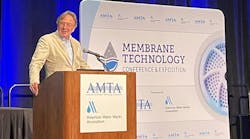WASHINGTON, DC, Sept. 9, 2014 -- Ninety seven percent of the nation's roughly 160,000 public water systems each serve fewer than 10,000 people and face several obstacles including limited resources, aging infrastructure and compliance with a variety of regulations. As such, the Environmental Protection Agency (EPA) has announced that it will provide over $8 million in funding to help create two national centers for research and innovation in small- to medium-sized drinking water systems to address these issues and more.
The recipients are the University of Colorado Boulder's Design of Risk Reducing, Innovative Implementable Small System Knowledge (DeRISK) Center, and the University of Massachusetts Amherst's Water Innovation Network for Sustainable Small Systems (WINSSS) Center. These two facilities will develop and test advanced, low-cost methods to reduce, control and eliminate groups of water contaminants that present challenges to communities worldwide.
"These centers will help to develop innovative and practical solutions for challenges faced by smaller drinking water systems, which make up the majority of public water systems in the United States," said Lek Kadeli, acting assistant administrator for EPA's Office of Research and Development. "Providing cost-effective solutions to help these systems deliver safe, high-quality drinking water will help improve the health, economy and security of our nation's communities."
The DeRISK and WINSSS centers will help strengthen the technical, managerial and financial capacities of drinking water providers throughout the country. Further, they will also collaborate with a range of stakeholders to support problem-oriented research on groups of water contaminants and their origins. This research marks a move towards developing transdisciplinary results that will be nationally acceptable and applicable.
These grants, part of EPA's research on safe and sustainable drinking water, support the development of water clusters -- networks of businesses, researchers and others involved in water technology. Colorado and Massachusetts are both home to water cluster organizations. These groups are leading the way in developing cutting-edge technologies and bringing them to the market, where they can solve water challenges that threaten health and daily activities while promoting technological innovation and economic growth.
See also:
"EPA awarding $2.1M to 17 states to revitalize urban waters"
"EPA to award $12.7M in grants to small U.S. drinking water, wastewater systems"
###


